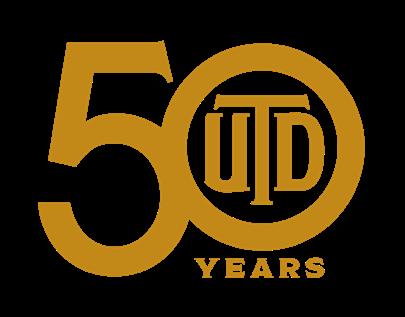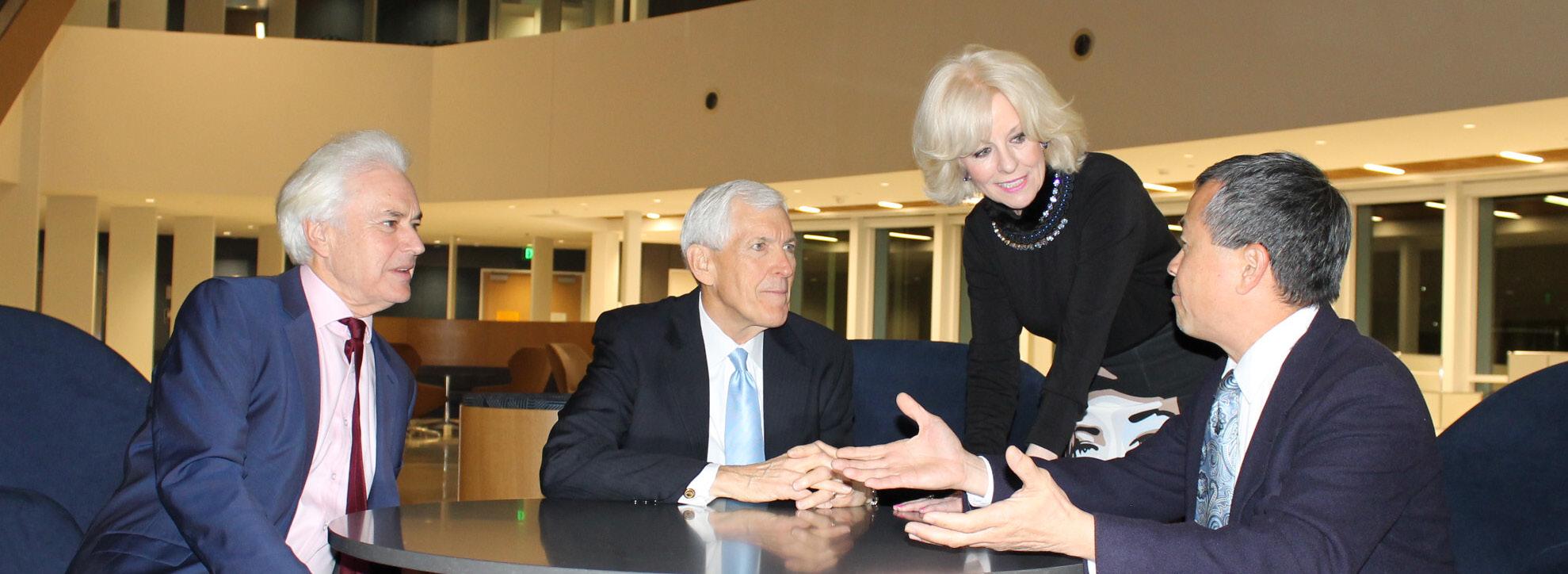THE UNIVERSITY OF TEXAS AT DALLAS
CELEBRATING 50 YEARS OF TRANSFORMATIVE HIGHER EDUCATION

BRAINHEALTH® SUMMER CAMPS

Looking for a summer camp that will challenge your pre-teen or teen to own their brain performance?
Brain Boost
Learn how to leverage your own brain power to enhance how you think, innovate and socialize.
CAMP ONE
June 22-25
1:00-5:00 PM
Ages 8-12
CAMP TWO
July 20-23
1:00-5:00 PM
Ages 13+
SMART Edge!
Learn how to learn with interactive, fun cognitive training that improves brain efficiency through deeper thinking and innovation.
CAMP ONE
June 8-19 9:30 AM-2:30 PM
Students entering grades 6-11
A Couple Who Cares Deeply
On January 28, Center for BrainHealth bestowed Linda and Joel Robuck with the 2020 Legacy Award, which recognizes individuals who have been instrumental in advancing BrainHealth‘s vision to explore the vast potential of the human brain.

development of our staff, and general well-being of the families we serve,” said Jonathan Smith, principal of D.W. Carter High School.
CAMP TWO
August 3-7 9:30 AM-3:00 PM
Students entering grades 5 & 6
More information at centerforbrainhealth.org/summer-camp
Among their many contributions, Linda and Joel are among the greatest champions of the Center’s Adolescent Reasoning Initiative, which to date has trained middle school teachers to provide cognitive training to reach more than 82,000 at-risk students.
“We are grateful beyond words for the investment the Robucks make to support the cognitive development of our students, professional
Joel shared that he and Linda are “pleased to be involved with BrainHealth’s meaningful work, particularly in support of its programs for active duty and veteran military service members and at-risk youth in South Oak Cliff. We see tremendous value in the research and programs delivered by BrainHealth, both across the country and right here in our community.”
Mother-daughter dinner chair duo Anne Mewhinney Monning and Sarah Monning Schoellkopf transformed the Dallas Country Club’s ballroom for the event to feel like Jackson
Hole, the Robucks’ favorite place to spend the summer and holidays, and made sure to include plenty of nods to UT Austin, Joel’s beloved alma mater, in everything from Longhorn wine charms at the head table to playing the UT fight song when Linda and Joel came to the podium to accept their award.
Mary McDermott Cook and Georgeann and Adm. (Ret.) William McRaven served as the event’s honorary co-chairs. Patrons were: The Eugene McDermott Foundation, Carol Heller, Carolyn and David Miller, Susie and John Adams, Karen and Charles Matthews, Robin and Eric Bennett/Tolleson Wealth Management, Center for BrainHealth, Debbie and Jim Francis, and The University of Texas System.
See event photos on Page 3

2 INSIDE THIS ISSUE
Pg
Brain Matters 2020 Q1 page 1 1ST QUARTER 2020
Category Builders UTD BrainHealth Imaging Center New Book: Bias in Financial Decisions Pg 3 Scenes from Legacy Award Dinner Spotlight on New Board Members Pg 4 Expert Voices
John Robuck, Caitlyn Robuck, Joel Robuck, Linda Robuck, Jackson Robuck, Carmina Robuck
3193 Dallas, TX
Anne Monning
Category Builders with a New Vision for Human Potential
1.
Center for BrainHealth is at the forefront of a new approach to brain science. We explore the power of the brain’s own adaptability as well as its potential to extend performance and even ward off disease. We are creating an entirely new vision of brain health:

The term “brain health” – as popularly used – is a misnomer because of the attention commonly placed on disease, injury and impairment. In the past 20 years, scientific understanding of the brain’s upward potential has been established by researchers at Center for BrainHealth and a few other brain scientists around the world. We continue to shed light on the myriad ways in which the brain can be trained to enhance its flexibility, resilience and capacity for reasoning, innovation and problem-solving.
2. MEASURING BRAIN HEALTH
Our research establishes objective, scientifically rigorous ways to assess the brain’s improvement in such areas as strategic attention, integrated reasoning, innovation and speed of processing. These performance measures correlate to physical changes in the brain, which can also be tracked. Our new UTD BrainHealth Imaging Center is uniquely focused on measuring physical and functional improvements in neural health.
3. IMPROVING COGNITIVE PERFORMANCE
Our translational research with diverse populations has conclusively demonstrated that cognitive training can improve performance (note our work with low-SES students), reduce stress and depressive symptoms (our work with warriors), and strengthen reasoning and resilience (our work with older adults).
UTD BrainHealth Imaging Center Contributing to New Science

Since it opened in December of 2019, multiple studies are already underway at the state-of-the-art UTD BrainHealth Imaging Center. To name just two, Dr. Francesca Filbey’s lab is studying the effects of marijuana on the brain, and Dr. Sandra Chapman’s lab is examining the effectiveness of cognitive training on breast cancer survivors suffering from “chemo brain”, the cognitive fog that can follow chemotherapy.
Magnetic Resonance Technologist Jason Grubb, RT (R) (MR) and Research Scientist
Sergey Cheshkov, PhD, provide crucial research support, implementing and testing novel pulse sequences as well as analyzing data quality. Grubb manages scanning procedures and safety, while Cheshkov designs optimal MR environments for specific research needs.

“We are excited to be at the forefront of neuroimaging centers,” said Grubb. “Our equipment provides a valuable resource to support cutting-edge studies in neuroimaging,” added Cheshkov.
Understanding Behavioral BIA$: A Guide to Improving Financial Decision-Making
Co-authored by Dr. Daniel Krawczyk, Deputy Director of Center for BrainHealth, and hedge fund manager George Baxter, this just-published book describes the financial biases most relevant to investing, as well as practical strategies that can help investors improve their performance by minimizing the negative influence of bias. From idea generation to constant improvement, the book categorizes biases and suggests thought processes to overcome them based on fundamental brain science. (available on amazon.com)
Dr. Krawczyk
page 2
DEFINING BRAIN HEALTH
With The BrainHealth Project™, which has now entered its pilot phase, we are adding the critical fourth dimension of scale: helping people everywhere gain a new understanding of brain health and the potential to enhance its fitness and performance. Onward!
This information comes from two perspectives, basic fundamental research about the mind and how it impacts our actual wealth, which is active investing as well as things like your 401k.
Center for BrainHealth
Sergey Cheshkov, Jason Grubb
Ian Robertson, Tom Leppert, Sandra Chapman, Geoff Ling
Scenes from 2020 Legacy Award Dinner









NEW BOARD MEMBERS
Lindsay Wilson is President of Corgan, a global architecture firm that promises clients Agility in Design. Lindsay has spent her career focused on workplace strategy and design. Technology has transformed the role of the office, enabling today’s workforce to work wherever, whenever. The dark side of the tech revolution is the barrage of information, interruption and distraction it brings. The stress on workers today led Lindsay to Center for BrainHealth and the brain science that holds the key to great workplace design. The science tells us about the importance of focused space for the type of deep thinking that enables innovation (hunting elephants!). By engaging with Center for BrainHealth, Lindsay believes that Corgan can positively impact the brain-healthy workplace of the future.

Catelyn and Andrew Fox learned of Center for BrainHeath through their philanthropic work with a young professionals organization. They immediately fell in love with the mission to improve brain health, and more specifically the Discovery Group’s strengths-based approach to caring for loved ones with Alzheimer’s. Catelyn’s mom, Anne Cappleman, was diagnosed with early onset Alzheimer’s in 2008, and the couple lovingly served as her caregivers and advocates over the next decade. Anne’s positive attitude and refusal to give up aligned seamlessly with the Center’s mission and values, and would ultimately be their motivation to join the advisory board.

Brain Matters 2020 Q1 page 3
Bitsy Carter, Harold Carter, Carol Heller
Gail Schoellkopf, Will Schoellkopf, Anne Monning, Bruce Monning
Debbie Francis, Linda Robuck, Ellen McStay
Susie Adams, Paul Rasmussen, Ashley Rasmussen, Chancellor James B. Milliken, Nana Smith
Dan Branch, Jim Francis, Dee Wyly, Stacey Branch
Mary McDermott Cook, Dan Patterson Jennifer Roberts, Peter Roberts Robin Bennett, Eric Bennett, Lyda Hill
Marvin Womack, John Robuck, Caitlyn Robuck, Joel Robuck, Linda Robuck, Jackson Robuck, Carmina Robuck, Eva Womack
LINDSAY WILSON
CATELYN AND ANDREW FOX
Expert Voices
Sleep to Live, Sleep to Learn
Russell G. Foster, PhD, BSc, FRS University of Oxford Professor and Collaborator on The BrainHealth Project™

(from a 217/20 talk at UTD)
Every aspect of our physiology and behavior is guided by a 24-hour beat arising from deep within our evolution, organized around the daily cycle of activity and sleep. In the active phase, energy expenditure and digestive processes are higher. Sleep activates other essential processes, including cellular repair, toxin clearance, memory consolidation and information processing. This sleep/wake cycle allows us to function optimally in a dynamic world.
Insufficient sleep causes harmful stress. Chronic sleep deprivation drives a widespread stress response that can lead to poor physical health, reduced cognitive function, frustration, low self-esteem, increased worry, anxiety and depression.
Happily, a number of approaches have been demonstrated to help improve sleep:

• Get as much morning natural light as possible
• Go to bed earlier
• Keep naps to 20 minutes, take them early in the day
• Exercise early in the day
• Have larger meals early in the day
• Avoid caffeine within six hours of bedtime
• Save stressful conversations for early in the day
• Create a soothing, consistent bedtime routine
• Reduce light exposure 30 minutes before bed – light intensity may be more important than color
• Minimize distractions and stimuli in the bedroom
• Keep the room cool
• Remove clocks to avoid “clock watching”
• Invest in a good mattress and pillow
If you do wake up during the night, try to relax knowing that sleep is likely to return as long as you avoid behaviors that increase alertness.
Highlights from February Lecture Series


FEBRUARY 4
The Greystone Foundation Lecture Charles J. Limb, MD Music and the Brain – A Window into Creativity



Even though life feels abstract as we go through it, it’s actually enabled by a physical organ: the brain. Artistic creativity is a neurologic product that can be examined using rigorous scientific methods.
FEBRUARY 11
The Linda and Joel Robuck Lecture
Satchin Panda, PhD When to Eat to Sleep Better
Almost every organ in our body has its own clock; the function of our brain clock is to act as a master conductor. So when the brain clock is much better, the symphony of our other clocks is better as well.
Areas in the brain involved in conscious self-monitoring and effortful planning turn off when musicians start improvising…. Jazz musicians are very good at letting this happen, not because they’re geniuses, but because they train their brains to do this.
FEBRUARY 18
The Caliber Home Loans Lecture
Sandra Chapman, PhD; Ian Robertson, PhD; Geoff Ling, MD, PhD; Tom Leppert, MBA

Unlocking Human Potential: Inside The BrainHealth Project
FEBRUARY 25
The Janis and Roy Coffee Lecture
Igor Grant, MD
A circadian lifestyle is when you have better rhythms and our brain and body are in balance, as we are in a healthy state.
The Therapeutic Potential of Cannabis: Fact vs. Fiction
Cannabis has the potential to reduce opioid use in the United States. We are learning that the optimal dosage of THC can be minimal. It may mean that you may be able to get the benefits at very low dosages.
When you look at how we have done in terms of improving longevity of the brain, we are lagging tremendously behind the longevity that is associated with the heart. Your heart lets you live longer; your brain lets you do longer.
For the first time ever, we are producing more knowledge than the capacity of our collective brains. If we don’t expand the capabilities of our brain, we risk losing the value of knowledge and solving the challenges in front of us.
In most countries, including the USA, it isn’t that easy to move forward with cannabis. We need to separate out discourse on medicinal cannabis from that of broader social policy on recreational use, as we have done with other abusable drugs.
The quality of our consciousness is defined by the quality of our sleep.
Russell G. Foster
Sandra Chapman, Satchin Panda, Linda and Joel Robuck
Satchin Panda
Igor Grant
Janis and Roy Coffee, Igor Grant
Tom Leppert, Geoff Ling, Sandra Chapman, Ian Robertson
Charles Limb, Andy McCarthy, Samara Kline
Charles Limb
Russell Foster


























